Steve Jobs unveiled the first iPhone 18 years ago
On January 9, 2007, in the shadow of the CES, Steve Jobs unveiled the iPhone. You know that it was an extraordinary and flawless demo from the outside, but what you don't remember is everything else that was launched -- nor how part of the keynote went wrong.
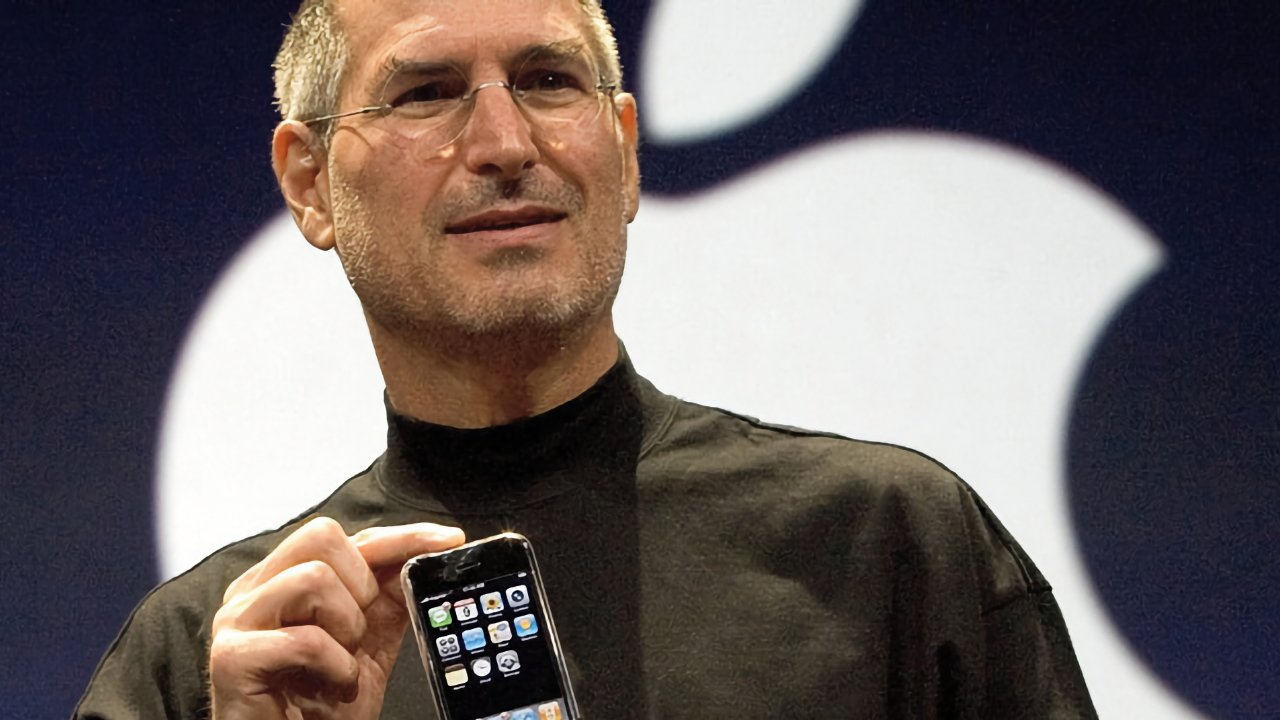
Steve Jobs with the original iPhone
Context is everything. On Sunday, January 7, 2007, Bill Gates gave the keynote address at the Consumer Electronics Show in Las Vegas.
Hammering home Microsoft's then buzz phrase of the 'Digital Decade,' he talked about how great hardware wasn't enough, that we needed connected experiences. "Where people are being productive, doing new creative things, where they're mobile... that is the key element that is missing."
He said that, "Vista and the PC continue to have the central role," though he also claimed that Windows Vista was "the highest quality release that we've ever done."
Two days later and around 400 miles away, Steve Jobs introduced the very device, the very experience that Gates said was missing from the world. He introduced the iPhone at Macworld San Francisco.
While Jobs didn't use the term 'post-PC era' then, that's what the iPhone created. This was truly the device for productive, creative people on the move, and as an extra bonus, it ran OS X -- now called macOS -- rather than Windows Vista.
Many more things
That 2007 keynote is justifiably famous for how well it introduced the iPhone. Jobs opened it by saying that, "We're going to make some history together today" and for once the reality was greater than the hyperbole.
His presentation is truly an example of a really finely produced keynote, and it takes you through the world of cell phones as they were before showing you exactly where they were all going wrong. And then how the iPhone would of course fix all that.
Today the opening segment showing what phones used to look like is a historical curiosity. But at the time, that wasn't the past, it was the present and these archaic-seeming phones were the best available.
If you dislike Apple, if your personal preference means you buy Androids instead of iPhones, you're still benefiting from that keynote today. During the many times Apple would later go to court over the similarities between iPhone and Android, it would present a graphic demonstrating its position, such as this one
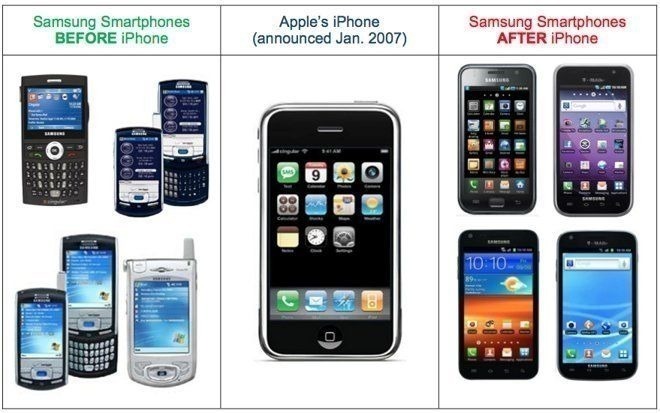
Chart showing the impact of iPhone on Samsung design
Many more things
Yet the presentation did feature other things, some of which were roundly applauded at the time and one other that we've only truly learned to appreciate in the years since.
Jobs opened the presentation by referring back to what he'd announced the previous year. That 2006 keynote had been when Apple not only announced it was moving from PowerPC to Intel processors, it vowed to complete the transition for all Mac models within 12 months. In 2007, he referred to this as being a "huge heart transplant" and that, "we did it in seven months."
He said that Apple's previous year had been remarkably successful and he also specified that over half of all new Mac buyers were now switching from Windows. It had recently been solely half of all buyers in Apple Stores, but now it was 50 percent wherever you could buy a Mac.
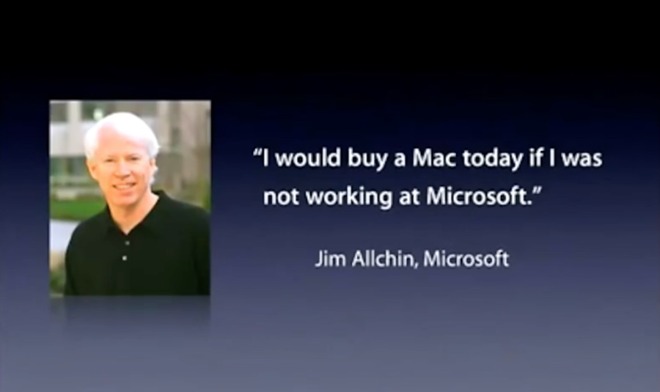
Jobs shows quote from Microsoft Senior Leadership Team's Jim Allchin about buying Macs
Next, he showed a quote from a 2004 internal memo at Microsoft where Jim Allchin of the company's Senior Leadership team said, "I would buy a Mac today if I was not working at Microsoft."
Jobs revealed that Allchin was shortly to retire, so he's "alerted our Seattle stores to keep an eye out for him and give him really good service."
The rest of that Allchin memo, incidentally, included the statement that "Longhorn [codename for Vista] is a pig and I don't see any solution to this problem." Jobs didn't quote that, but he did run a new ad from the Get a Mac campaign specifically aimed at Vista.
"So 2007 is going to be a great year for the Mac," said Steve Jobs, "but this is all we're going to talk about the Mac today. We're going to move on to some other things."
Remember that back in the mid-2000s, there were more rumors about Apple introducing a phone than there were for many years about it making a car. Vastly more. So with these words, he was surely going to make the big announcement next.
Except he didn't.
Instead, Jobs seemed to tease us by talking about Apple's music business. However, what appeared to be a diversion, or maybe even padding, was just the first part of setting the stage for the day's real purpose.
But for now, Jobs revealed that they had just passed 2 billion song sales and that the iPod had become the world's most popular video player "by a large margin." He revealed that in the then first four months that movies had been available on iTunes, people had bought 1.3 million of them.
At the time, there were only 100 films on the service, and Jobs announced this would increase to 250 because Paramount was coming to iTunes.
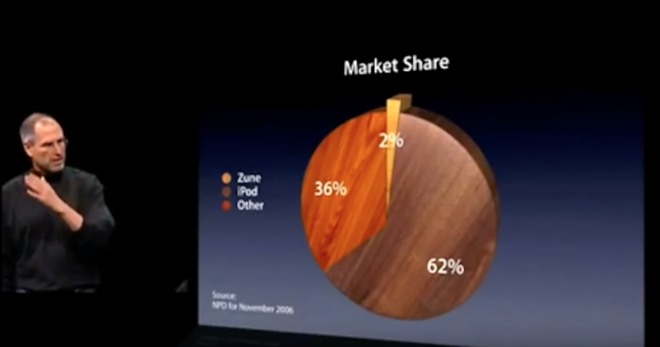
Steve Jobs mocks the launch-month market share of the Microsoft Zune
Jobs managed to make 250 movies sound good -- but there was one figure he didn't even try to put a gloss on. And that was sales of the Zune, Microsoft's iPod killer which had been released the previous November.
Only figures for its first month were available, but they showed that after a big launch, the Zune had managed no more than a 2 percent market share.
"No matter how you try to spin this, ah, what can you say?" said Jobs.
At last the iPhone
Finally, at 24 minutes into the presentation, Jobs paused. "This is a day I've been looking forward to for two-and-a-half years," he said.
Later, at the end of the keynote and when it had gone so well, he also confessed on stage: "You know, I didn't sleep a wink last night, I was so excited about today."
It turned out that there were other reasons to not sleep a wink and Apple engineers knew them all. While it was only revealed very much later, Jobs's presentation was attended by iPhone engineers who knew how easily it could all have gone wrong. The software wasn't finished, the whole phone was still being worked on, and if Jobs deviated from the planned demo in any way, it was likely that the phone would crash.
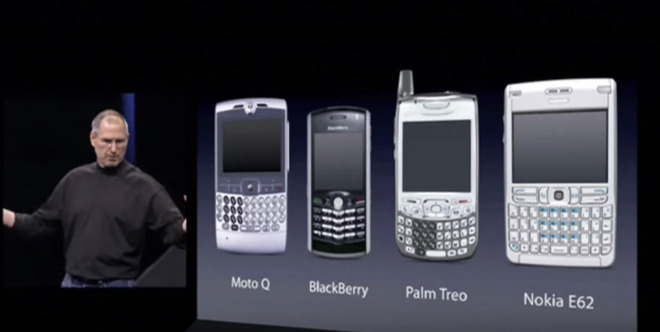
Steve Jobs with the then most popular smart phones in 2007
Instead, as you know, the whole presentation went flawlessly. Or rather, most of it did.
My clicker isn't working
Having successfully concluded the demo of the new iPhone, Jobs went on to talk about market share and clicked to move on to his next slide. And clicked. And clicked.
He explained that the clicker wasn't working and picked up a spare -- which appeared to also not work. "They're scrambling backstage right now," he told the audience.
This segment is completely forgotten, yet at a key moment on this most crucial presentation of his Apple career, it went wrong. You can only imagine how nervous it must've made Jobs.
But then you can also admire how he managed to fill for 55 seconds with a story about how Steve Wozniak had built a clicker-like device at college to mess with people's TV reception.
Aiming for 1 percent
Earlier, Jobs had made you think that the Zune's 2 percent market share was disastrous. When he got the slides working, he built up to saying that Apple was aiming for a 1 percent share of the cellphone market -- and that this was great.
There was a bit of a difference though. Using the latest 2006 figures available, Jobs said that the cell market had been around one billion phones. Apple was aiming for 10 million iPhones in the first year.
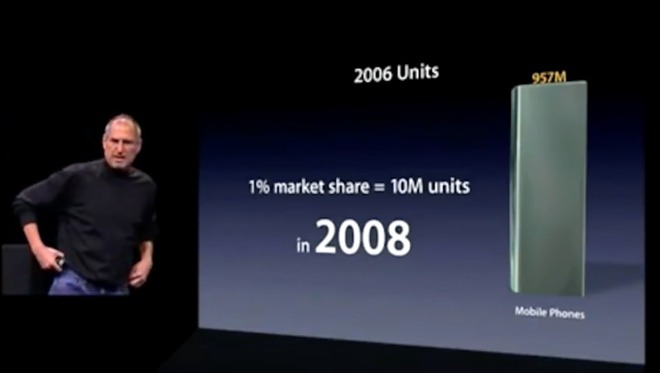
Apple's aims for iPhone sales now seem modest
The iPhone didn't actually launch until June, but it then took only 74 days for the company to sell its first million of them.
Different company
It's just that the company was no longer Apple Computer, Inc. The very last thing Steve Jobs announced at this presentation 15 years ago was that the company was changing its name.
Standing in front of a side that showed the Mac, iPod, Apple TV, and iPhone, he pointed out that only the first of those is truly what you'd call a computer. "We've thought about this," he said, talking about how Apple was doing more than just computers, "and we thought maybe our name should reflect this a little bit more than it does."
From this day on, the company would now be known as just Apple, Inc -- and it would truly never be the same again. Everything it sells is really a computer, but only the Mac would resemble what people think of when they use the term.
Many more things
There were examples of non-computer devices from Apple before, such as the Pippin game console in the 1990s. But that failed, and now instead the iPhone launched a whole new category of devices.
That category includes the many iterations of the iPhone, but also the iPod touch. Plus, of course, all the variations of the iPad.
Between all of these, in September 2018, Tim Cook was able to announce that Apple was close to shipping its 2 billionth iOS device.
At the time, AppleInsider worked the numbers and calculated that the 2 billionth iPhone -- specifically iPhone -- would be sold in the middle of 2021. That was based on the recognition that iPhone sales had already been declining worldwide, although at this point no one imagined the impact of the coronavirus on all phone sales.
Apple doesn't report iPhone sales, and it has never announced crossing the 2 billion figure. However, in January 2021, Apple announced that there were then over 1 billion iPhones in current, active use.
That's not sold, not pre-ordered, but over 1 billion iPhones being used every day. And at the same time, Cook said there were 1.65 billion Apple devices in use worldwide.
In February 2023, Cook was able to update that total. "During the December quarter," he said, "we achieved a major milestone and are excited to report that we now have more than 2 billion active devices as part of our growing installed base."
The iPhone was an enormous gamble, but it continues to pay off enormously.
Read on AppleInsider



Comments
The 62% iPod marketshare should have easily translated to %70 iPhone marketshare.
The fact the U.S. and tech companies allowed android to create patent-infringing knockoffs just to make a quick buck for carriers who doubted iPhone is sad. Then came the commercials attacking Apple which created the rabid iKnockoff Knights who shit on everything Apple worked hard for THEM to enjoy!
10 million dollars is %1 of a billion. Although I think Jobs was talking about 10M units not $ as that was very little money for such a massive project.
And, I still can't believe the value that it created for my stock portfolio in the past 12 years, which, in turn, enabled me to do a lot of things that I otherwise could not have.
I bought 2, Day-One! (Full price!) One for myself and on for my 17 year old daughter...
...I asked her how she liked the iPhone and she said, 'Dad, my whole life is in this phone!' Admittedly, is more charming a comment in 2007 than it is today.
I gave her my MacBook, and with her iPhone, I like to think they both got her thru Med School!
(Fortunately, she has her mother's brains and is now an Anesthesiologist, MD!)
I was in real estate and it was a game changer for me...the iPhone was the ultimate communication deviceI So much so, that I stopped carrying my original intel MacBook around with me.
Text was not that big back then...but the Visual voicemail, the access to email, contact management and access to PDF's was a game changer! I could answer 'contract,' 'counter offers,' and submission emails with, 'yep I have it, will get back to you, shortly!"
Arrive home, whenever I 'arrived' and handle the 'heavy lifting' on my 2006 original intel iMac at home.
No stress b/c the iPhone allowed me to send a quick response. I didn't have to rush home. Being stressed the whole time!
Anyway, good times!
Best.
I do think Apple may get its revenge, though. 'Privacy' or lack, thereof, may undo, to some extent, Google/Android!
Finger's crossed!
P.S. Lots of commas in this post, my apologies!
I miss the HUNGRY old Apple... To them something was never good enough, no matter how good we (consumers) thought it was behind the scenes there was so much pain over every detail, coma, dot, fold, and crease. That's
gone now.
They are too much of a lumbering giant I fear...
As an Apple retail employee we each got given a free iPhone and I can still remember walking home, marvelling at how beautiful it was and how great it felt in my hand.
The stock price a few years later was pretty marvellous as well.
Cheers Steve, RIP.
A lot of people discover wine through wines like White Zinfandel, with its sweet and generic blend that hides the nuances of individual grape varieties it may contain, but very few who’ve tried Justin Vineyards Isosceles, for example, go back. Oenophiles refer to this as ‘graduating,’ as in, “white Zinfandel was what we drank before we graduated to other, more serious and expensive wines.”
In a similar way, moving up to iOS from Android can be thought of as graduating to a better experience. The similarities present in Android’s U/X, due to it having been inspired by the original iPhone, allow an easier transition versus some other path Apple’s competition might have gone down had they developed a competing mobile OS without the benefit of the iPhone example. And this might be what led Tim Cook to refer to Android as a smartphone training ground. For a huge number of people. including yours truly, our first smartphone experience is on Android, but many aspire to graduate to iOS, or more specifically, to an iPhone. The similarities make not only the eventual transition easier, but also make the comparison easier; you pinch to zoom on your $120 Huawei nova 3i and it stutters and then, when it catches up to your intent, zooms too far because you, in exasperation, started repeating and excentuating your pinch gesture. I’ve seen it on Hauwei, Samsung, Oppo and Vivo phones among friends and dates here in the Philippines. Then you see your friend or co-worker on an old iPhone 4S (of which there are plenty here) pinch and zoom with real-time smooth response. You’re sold. You want to graduate. Lol
Some people just hate Apple.
( nobody really cares about privacy and they don't see the difference between Apple and Google when they do).
1) The iPhone didn't actually work and you couldn't play with it. It was displayed behind a clear glass cylinder on a rotating pedestal under glaringly bright halogen lights.
2) Macworld's (I routinely attended the ones in Boston and San Francisco) were unique in that it was the rare opportunity to meet and discuss Apple products with key managers and engineers (both hardware and software). In the early years you could even meet Steve personally on the floor. At this event, post keynote the crowd was intense and Steve was accosted by a local pro-sex advocate that resulted in a bit of a tussle involving security. Steve increased security greatly following this incident.
While Macworld provided the rare opportunity to interact with Apple, this was a two way situation that resulted in some leakage of info. This along with Apple's wise decision to manage its own rollout schedule were the reasons Apple left Macworld, and a few years later it ceased to exist.
3) I had the opportunity to discuss two new companies that I thought Apple should look into with some of the engineers: Tableau (a data visualization program), and Dropbox (just starting up) Both went on to become unicorns. I increased my holdings in APPL and later when both these companies went public also purchased their stocks.
4) I ordered the iPhone and months later I received one of the first ones and found myself in Russia on a business trip. It was the first commercial one in Russia and I drew a crowd at the St. Petersburg Apple (I don't believe Apple owned this store, but it was the only sanctioned one at the time) store when I dropped by. No carriers in Russia supported the iPhone but it worked well over wi-fi. Later in the trip in Murmansk I found a good wi-fi signal at a modern mall. After a few minutes with my nose glued to my iPhone while checking mail I noticed a ruckus in the food court I was in and found the local teenagers, who even then were expert hackers, had located my iPhone while hacking the wi-fi network and they were all searching around to see who had the iPhone. I pulled up my hoody and made for the exit.
I am sure Avon B7 will mention that he has NOT observed this issue EVER in his honor phone (honor 20 if I remember correctly) or his previous android phone(s) in the last 4-5 years. Android has come a long long way when it comes to performance and smoothness while using it in the last 3 to 4 years. I am not doubting your observation. Could it be a case of a buggy app?
The iPhone won in the end. No longer texting and driving is probably a good thing anyways...
I'm not sure I have the Original iPhone but probably still have a 3 or 3S around here....astounding how great it is but also how limited/slow it feels compared to what came after